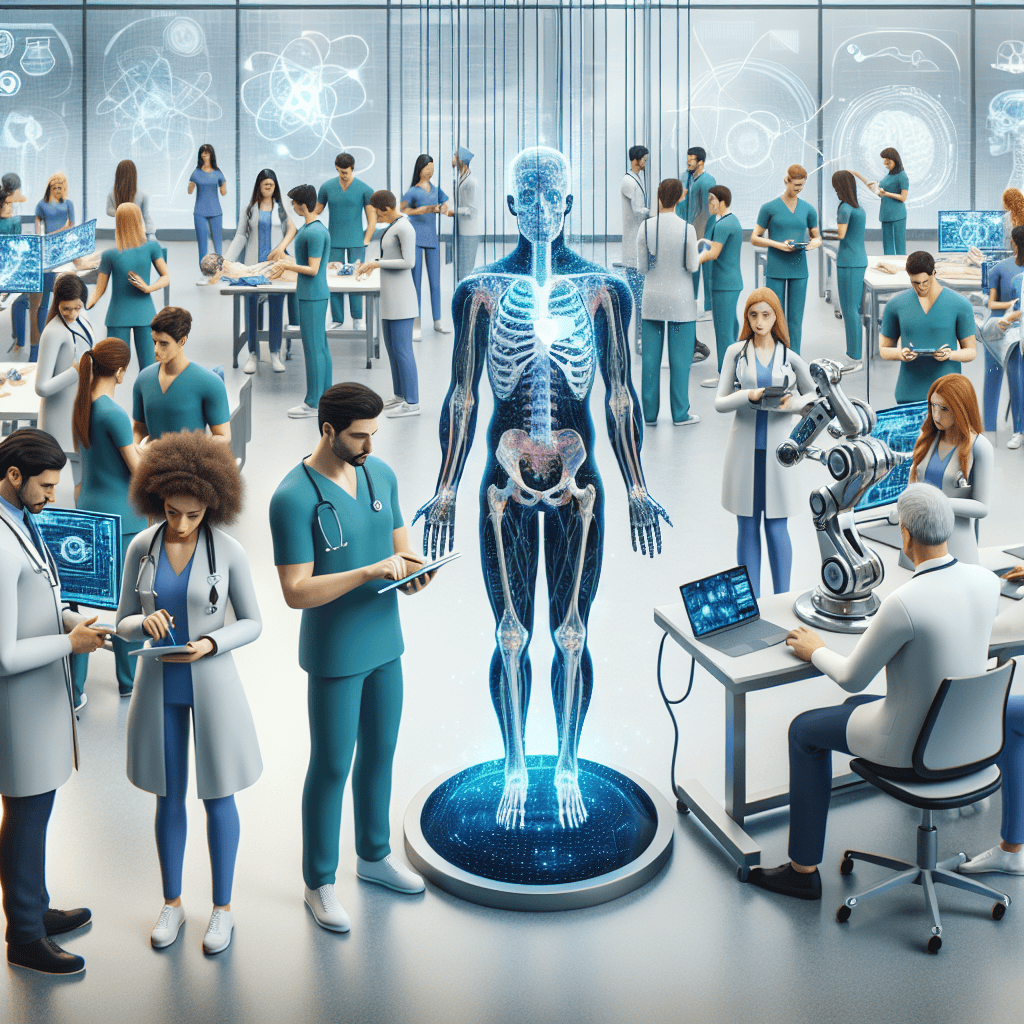Integrating AI Training into Medical Education

The integration of Artificial Intelligence (AI) into various sectors has been transformative, and the field of medicine is no exception. As AI continues to evolve, its potential to revolutionize medical education becomes increasingly apparent. This article explores the integration of AI training into medical education, examining its benefits, challenges, and future prospects. By delving into five key subtopics, we aim to provide a comprehensive understanding of how AI can enhance the training of future medical professionals.
The Role of AI in Modern Medicine
AI has become a cornerstone of modern medicine, offering innovative solutions to complex problems. Its applications range from diagnostics to personalized treatment plans, making it an indispensable tool for healthcare professionals. Understanding the role of AI in medicine is crucial for integrating it into medical education effectively.
AI in Diagnostics
AI’s ability to analyze vast amounts of data quickly and accurately has made it a valuable asset in diagnostics. Machine learning algorithms can identify patterns in medical images, such as X-rays and MRIs, that may be missed by the human eye. For instance, AI systems have demonstrated proficiency in detecting early signs of diseases like cancer, often outperforming human radiologists.
One notable example is Google’s DeepMind, which developed an AI model capable of diagnosing over 50 eye diseases with accuracy comparable to that of expert ophthalmologists. Such advancements highlight the potential of AI to enhance diagnostic accuracy and speed, ultimately improving patient outcomes.
AI in Personalized Medicine
Personalized medicine tailors treatment plans to individual patients based on their genetic makeup, lifestyle, and other factors. AI plays a pivotal role in this approach by analyzing genetic data and predicting how patients will respond to specific treatments. This capability allows for more effective and targeted therapies, reducing the trial-and-error approach often associated with traditional medicine.
For example, IBM Watson for Oncology uses AI to analyze patient data and recommend personalized treatment options. By considering a patient’s unique genetic profile and medical history, AI can suggest therapies that are more likely to be effective, minimizing adverse effects and improving overall care.
AI in Predictive Analytics
Predictive analytics involves using data to forecast future events, such as disease outbreaks or patient deterioration. AI enhances predictive analytics by processing large datasets and identifying trends that may not be immediately apparent. This capability is particularly valuable in public health, where early detection of disease outbreaks can prevent widespread transmission.
During the COVID-19 pandemic, AI models were used to predict the spread of the virus and assess the effectiveness of containment measures. These models provided valuable insights that informed public health strategies and resource allocation, demonstrating the critical role of AI in managing global health crises.
AI in Robotic Surgery
Robotic surgery is another area where AI has made significant strides. AI-powered robotic systems assist surgeons in performing complex procedures with greater precision and control. These systems can analyze real-time data during surgery, providing feedback and suggestions to enhance surgical outcomes.
The da Vinci Surgical System is a prime example of AI in robotic surgery. It allows surgeons to perform minimally invasive procedures with enhanced dexterity and accuracy. Studies have shown that robotic-assisted surgeries often result in shorter recovery times and fewer complications, underscoring the benefits of integrating AI into surgical practice.
AI in Medical Research
AI is also transforming medical research by accelerating the discovery of new drugs and treatments. Machine learning algorithms can analyze vast datasets to identify potential drug candidates and predict their efficacy. This capability significantly reduces the time and cost associated with traditional drug discovery methods.
For instance, AI was instrumental in the rapid development of COVID-19 vaccines. By analyzing genetic data and simulating potential vaccine candidates, AI models helped researchers identify promising options quickly. This accelerated timeline was crucial in addressing the global health emergency and highlights the potential of AI to expedite medical research.
Challenges in Integrating AI into Medical Education
While the benefits of AI in medicine are clear, integrating AI training into medical education presents several challenges. These challenges must be addressed to ensure that future healthcare professionals are equipped with the skills needed to leverage AI effectively.
Lack of Standardized Curriculum
One of the primary challenges in integrating AI into medical education is the lack of a standardized curriculum. Medical schools vary widely in their approach to teaching AI, with some offering comprehensive courses while others provide minimal exposure. This inconsistency can lead to disparities in AI proficiency among medical graduates.
To address this issue, educational institutions must collaborate to develop a standardized AI curriculum that covers essential topics such as machine learning, data analysis, and ethical considerations. This curriculum should be integrated into existing medical programs to ensure that all students receive a foundational understanding of AI.
Resource Constraints
Implementing AI training in medical education requires significant resources, including access to technology, qualified instructors, and updated course materials. Many medical schools, particularly those in low-resource settings, may struggle to meet these requirements.
To overcome resource constraints, institutions can explore partnerships with technology companies and online platforms that offer AI training resources. Additionally, governments and private organizations can provide funding and support to ensure that all medical schools have the necessary resources to incorporate AI into their curricula.
Resistance to Change
Resistance to change is a common challenge in any educational reform, and the integration of AI into medical education is no exception. Some educators and practitioners may be hesitant to adopt new technologies, fearing that AI could replace human expertise or disrupt traditional teaching methods.
To address this resistance, it is essential to emphasize the complementary role of AI in medicine. AI should be viewed as a tool that enhances human capabilities rather than replacing them. By highlighting successful case studies and demonstrating the tangible benefits of AI in medical practice, educators can foster a more positive attitude towards AI integration.
Ethical and Legal Considerations
The use of AI in medicine raises important ethical and legal considerations that must be addressed in medical education. Issues such as data privacy, algorithmic bias, and accountability for AI-driven decisions are critical topics that future healthcare professionals must understand.
Medical schools should incorporate discussions on ethical and legal considerations into their AI curricula, encouraging students to critically evaluate the implications of AI in healthcare. By fostering a strong ethical foundation, educators can prepare students to navigate the complex landscape of AI in medicine responsibly.
Keeping Pace with Technological Advancements
The rapid pace of technological advancements in AI presents a challenge for medical education. As new AI tools and techniques emerge, educators must continuously update their curricula to ensure that students are learning the most relevant and up-to-date information.
To keep pace with technological advancements, medical schools can establish partnerships with AI research institutions and industry leaders. These collaborations can provide educators with insights into the latest developments in AI, enabling them to incorporate cutting-edge knowledge into their teaching.
Strategies for Effective AI Integration in Medical Education
To successfully integrate AI training into medical education, institutions must adopt effective strategies that address the challenges outlined above. By implementing these strategies, medical schools can equip future healthcare professionals with the skills needed to harness the power of AI in their practice.
Developing a Comprehensive AI Curriculum
A comprehensive AI curriculum is essential for providing students with a solid foundation in AI concepts and applications. This curriculum should cover key topics such as machine learning, data analysis, natural language processing, and ethical considerations. Additionally, it should include hands-on training with AI tools and technologies to ensure that students gain practical experience.
Medical schools can collaborate with AI experts and industry leaders to develop a curriculum that reflects the latest advancements in the field. By incorporating real-world case studies and examples, educators can demonstrate the practical applications of AI in medicine, making the learning experience more engaging and relevant.
Incorporating Interdisciplinary Learning
AI is inherently interdisciplinary, drawing on fields such as computer science, data science, and engineering. To effectively integrate AI into medical education, institutions should promote interdisciplinary learning by encouraging collaboration between medical students and students from other disciplines.
Interdisciplinary projects and workshops can provide students with opportunities to work together on AI-related challenges, fostering a deeper understanding of how AI can be applied in healthcare. By breaking down traditional silos between disciplines, educators can create a more holistic learning environment that prepares students for the collaborative nature of modern medicine.
Leveraging Online Learning Platforms
Online learning platforms offer a flexible and accessible way to deliver AI training to medical students. These platforms provide a wealth of resources, including video lectures, interactive tutorials, and coding exercises, that can supplement traditional classroom instruction.
Medical schools can partner with online platforms that specialize in AI education, such as Coursera, edX, and Udacity, to provide students with access to high-quality AI courses. By leveraging these platforms, institutions can overcome resource constraints and ensure that all students have access to comprehensive AI training.
Fostering a Culture of Innovation
To successfully integrate AI into medical education, institutions must foster a culture of innovation that encourages experimentation and embraces new technologies. This culture should be reflected in both the curriculum and the broader educational environment.
Educators can promote a culture of innovation by encouraging students to explore AI-related research projects and participate in hackathons and competitions. By providing opportunities for students to apply their AI knowledge in creative ways, institutions can inspire a new generation of healthcare professionals who are eager to embrace technological advancements.
Continuous Professional Development for Educators
Educators play a crucial role in integrating AI into medical education, and their professional development is essential for ensuring that they are equipped to teach AI effectively. Institutions should provide ongoing training and support for educators to help them stay current with the latest developments in AI.
Professional development programs can include workshops, seminars, and conferences focused on AI in medicine. By investing in the continuous development of educators, institutions can ensure that they are well-prepared to deliver high-quality AI training to their students.
Case Studies: Successful AI Integration in Medical Education
Several institutions have successfully integrated AI training into their medical education programs, providing valuable insights into effective strategies and best practices. These case studies highlight the potential of AI to enhance medical education and prepare students for the future of healthcare.
Stanford University School of Medicine
Stanford University School of Medicine is a leader in integrating AI into its medical curriculum. The institution offers a range of AI-focused courses, including “AI in Healthcare” and “Machine Learning for Medicine,” which provide students with a comprehensive understanding of AI applications in healthcare.
Stanford’s AI curriculum emphasizes hands-on learning, with students participating in projects that involve developing AI models for medical diagnostics and treatment planning. The institution also collaborates with industry partners to provide students with access to cutting-edge AI tools and technologies.
Harvard Medical School
Harvard Medical School has incorporated AI training into its curriculum through the “AI in Medicine” course, which covers topics such as machine learning, natural language processing, and ethical considerations. The course is designed to provide students with a foundational understanding of AI and its applications in healthcare.
Harvard’s approach to AI education emphasizes interdisciplinary learning, with students from medicine, computer science, and engineering working together on AI-related projects. This collaborative approach fosters a deeper understanding of how AI can be applied in healthcare and encourages students to think creatively about potential solutions to medical challenges.
University of Toronto Faculty of Medicine
The University of Toronto Faculty of Medicine has integrated AI training into its curriculum through the “AI in Healthcare” program, which offers courses on machine learning, data analysis, and AI ethics. The program is designed to provide students with a comprehensive understanding of AI and its applications in medicine.
The University of Toronto emphasizes experiential learning, with students participating in hands-on projects that involve developing AI models for medical diagnostics and treatment planning. The institution also collaborates with industry partners to provide students with access to cutting-edge AI tools and technologies.
Johns Hopkins University School of Medicine
Johns Hopkins University School of Medicine has integrated AI training into its curriculum through the “AI in Medicine” course, which covers topics such as machine learning, natural language processing, and ethical considerations. The course is designed to provide students with a foundational understanding of AI and its applications in healthcare.
Johns Hopkins emphasizes interdisciplinary learning, with students from medicine, computer science, and engineering working together on AI-related projects. This collaborative approach fosters a deeper understanding of how AI can be applied in healthcare and encourages students to think creatively about potential solutions to medical challenges.
University of California, San Francisco (UCSF) School of Medicine
The University of California, San Francisco (UCSF) School of Medicine has integrated AI training into its curriculum through the “AI in Healthcare” program, which offers courses on machine learning, data analysis, and AI ethics. The program is designed to provide students with a comprehensive understanding of AI and its applications in medicine.
UCSF emphasizes experiential learning, with students participating in hands-on projects that involve developing AI models for medical diagnostics and treatment planning. The institution also collaborates with industry partners to provide students with access to cutting-edge AI tools and technologies.
The Future of AI in Medical Education
The integration of AI into medical education is an ongoing process that will continue to evolve as technology advances. As AI becomes increasingly sophisticated, its potential to transform medical education and practice will only grow. By embracing AI, medical schools can prepare future healthcare professionals to navigate the complexities of modern medicine and deliver high-quality care to patients.
AI-Driven Personalized Learning
AI has the potential to revolutionize medical education by enabling personalized learning experiences tailored to individual students’ needs and learning styles. AI-driven platforms can analyze students’ performance data to identify areas where they may need additional support or practice, providing targeted feedback and resources to help them succeed.
This personalized approach to learning can enhance student engagement and improve educational outcomes, ensuring that all students have the opportunity to reach their full potential. As AI technology continues to advance, its ability to deliver personalized learning experiences will become increasingly sophisticated, offering new opportunities for innovation in medical education.
Virtual Reality and Simulation-Based Training
Virtual reality (VR) and simulation-based training are emerging as powerful tools for medical education, offering immersive learning experiences that allow students to practice clinical skills in a safe and controlled environment. AI can enhance these technologies by providing real-time feedback and adaptive learning experiences that respond to students’ actions and decisions.
For example, AI-powered VR simulations can provide students with realistic scenarios that mimic real-world clinical situations, allowing them to practice decision-making and problem-solving skills in a risk-free setting. As these technologies continue to evolve, they will play an increasingly important role in medical education, providing students with valuable hands-on experience and preparing them for the challenges of clinical practice.
AI-Enhanced Research Opportunities
AI has the potential to transform medical research by enabling new discoveries and insights that were previously unattainable. By integrating AI into medical education, institutions can provide students with opportunities to engage in cutting-edge research projects that leverage AI technology.
These research opportunities can help students develop critical thinking and problem-solving skills, as well as a deeper understanding of how AI can be applied to address complex medical challenges. By fostering a culture of innovation and research, medical schools can prepare students to become leaders in the field of AI-driven healthcare.
Ethical and Social Implications of AI
As AI becomes increasingly integrated into medical practice, it is essential for future healthcare professionals to understand the ethical and social implications of AI technology. Medical education must address these issues by incorporating discussions on topics such as data privacy, algorithmic bias, and the impact of AI on healthcare delivery.
By fostering a strong ethical foundation, medical schools can prepare students to navigate the complex landscape of AI in medicine responsibly. This understanding will be critical as AI continues to shape the future of healthcare, ensuring that technology is used in a way that benefits patients and society as a whole.
Collaboration with Industry and Technology Leaders
The successful integration of AI into medical education will require collaboration between educational institutions, industry leaders, and technology companies. By working together, these stakeholders can develop innovative solutions and resources that support the integration of AI into medical curricula.
Partnerships with industry leaders can provide medical schools with access to cutting-edge AI tools and technologies, as well as insights into the latest developments in the field. These collaborations can also create opportunities for students to engage in real-world projects and gain valuable experience working with AI technology.
Conclusion
The integration of AI training into medical education is a critical step in preparing future healthcare professionals for the challenges and opportunities of modern medicine. By embracing AI, medical schools can enhance their curricula, provide students with valuable skills and knowledge, and ultimately improve patient care.
While there are challenges to overcome, the potential benefits of AI in medical education are significant. By adopting effective strategies and fostering a culture of innovation, institutions can successfully integrate AI into their programs and prepare students for the future of healthcare.
As AI continues to evolve, its role in medical education will only grow, offering new opportunities for innovation and transformation. By staying at the forefront of this technological revolution, medical schools can ensure that their graduates are well-equipped to navigate the complexities of modern medicine and deliver high-quality care to patients.





